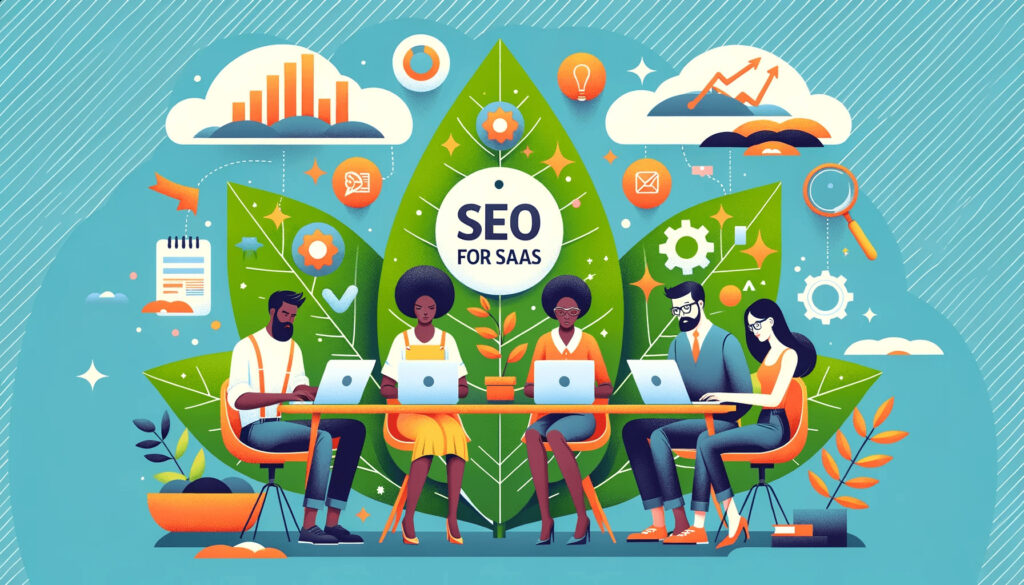When it comes to sustaining visibility and competitiveness in the digital landscape, SEO for SaaS companies is an indispensable tool. This article shares invaluable insights and strategies to tactically employ SEO, propelling your SaaS business to new heights. Without dwelling on the basics, it jumps straight into substantial knowledge and practical guidelines for effective SEO use in the SaaS industry, exploring advanced methods to enhance your digital footprint and stay ahead of the curve.

Understanding the Importance of SEO for SaaS
In today’s digital age where online presence largely determines a business’s success, search engine optimization (SEO) becomes crucial in establishing visibility and awareness — especially for Software-as-a-Service (SaaS) industries. Since you’re offering a cloud-based service, you’re not confined to local or regional markets; you potentially have a global audience, making the digital marketplace for SaaS highly competitive. Thus, you need strong SEO strategies to improve your online visibility and stand out amongst the competition.
Significance of SEO for SaaS Industries
When it comes to SaaS industries, SEO plays an integral role in attracting potential users and promoting the product or service. It’s not just about ranking high on search engine results; a meticulously planned and efficiently executed SEO strategy can mean more organic traffic, increased credibility, and better brand awareness. A compelling SEO strategy could significantly lower your customer acquisition costs, especially since paid ad strategies can get expensive in the competitive SaaS landscape.
Why SEO can’t be Ignored in SaaS Marketing
Remember, your target audience mostly consists of tech-savvy individuals who likely use search engines to find the software solutions they need. If your website is not among the top search results, then you’re missing out on a substantial amount of potential business. Ignoring SEO in SaaS marketing can result in reduced online visibility and a low organic ranking, which could hinder potential customers from finding your services.
Keyword Research for SaaS SEO
SEO strategy begins with keyword research. It helps you understand the topics your target customers care about and the language they use, thereby guiding your overall SEO strategy.
Importance of Appropriate Keyword Selection
In the realm of SaaS SEO, choosing the right keywords can be the difference between attracting targeted traffic to your site and getting lost in the vastness of the internet. Appropriate keyword selection goes beyond choosing high-traffic keywords; it’s about understanding your target audience’s search intent and matching it with your content.
Techniques for Uncovering Optimal Keywords for SaaS
Uncovering the right keywords for SaaS requires utilizing tools and techniques like competitor analysis, Google Trends, and keyword research tools to identify what keywords your potential customers are using to search for services similar to yours.
Optimizing Website Structure and Design for SaaS SEO
SEO isn’t just about keywords and content; your website’s structure and design play a substantial role.
Role of UX in SaaS SEO
User Experience (UX) is a critical component of SEO for SaaS businesses. Search engines like Google favor websites that offer an excellent user experience. Things like easy navigation, a clean design, and logical content organization can make a huge difference in your site’s ranking.
Designing an SEO-friendly Site Architecture
An SEO-friendly site architecture allows search engines to crawl and index your website effectively, improving its organic rankings. A well-structured website will also enhance the user experience, which can impact the site’s bounce rates and time-on-page—two factors mainly considered by Google’s ranking algorithm.
Content Strategy for SaaS SEO
Having a strategic content plan is essential for SaaS SEO. It’s about creating relevant, high-quality content that answers the queries your potential customers are making online.
Creating Quality Content for SaaS Websites
For SaaS websites, creating quality content means providing detailed, practical, and relevant information about your services. Informative guides, how-to articles, thought leadership content, and uses cases are various types of content that can attract and retain customers.
Utilizing Blog and Articles for an SEO Boost
Blog posts and articles are excellent mediums to incorporate keywords organically without compromising content quality. They can also help you cover a wide range of topics related to your software services and industry trends, thus creating more entry points for potential customers.
Role of Infographics and Videos in SaaS SEO
In the SaaS industry, where services could be intricate, incorporating infographics and video tutorials can significantly improve user understanding and engagement. More importantly, rich media like these are favored by Google, providing an SEO boost.
On-Page Optimization for SaaS SEO
On-page optimization refers to all changes you can make on your website to improve its visibility. This includes optimizing title tags, meta descriptions, header tags, image texts, and incorporating internal linking strategies.
Title Tags and Meta Descriptions
Title tags and meta descriptions give search engines and users a brief overview of your page’s content. They have a direct impact on click-through rates and user experience, influencing your site’s SEO.
Header Tags and Keyword Placement
Header tags (H1, H2, H3, etc.) make your content scannable and easy-to-read. They can also be strategically used to include your targeted keywords.
Image Optimization
Image optimization ensures faster page loading times and improved user experience — two factors that contribute significantly to better SEO ranking. This includes using descriptive file names, reducing image file sizes, and using alt tags to provide a description for search engines.
Internal Linking Strategies
Internal linking connects your content and gives search engines an idea of your website’s structure. They can help search engines index your content and improve the user experience by helping them navigate the site.
Off-Page Optimization for SaaS SEO
Off-page optimization entails strategies conducted outside your website that affect your site’s trustworthiness and authority. This mainly involves building high-quality backlinks and optimizing your social media presence.
Building High Quality Backlinks
Backlinks from reputable sites tell search engines that your content is valuable and trustworthy, thereby improving your site’s SEO. For SaaS companies, guest blogging, having an influencer endorse or review your product, or having your content shared on social media are excellent ways to build high-quality backlinks.
Social Media Optimization
Though social media signals do not directly impact SEO, having a strong social presence can lead to higher visibility, engagement, and the potential for your content to be shared – all of which can indirectly boost your SEO.
Strategies for Off-Page SEO Success
Successful off-page SEO strategies involve cultivating relationships with influencers, guest posting, and engaging on social media platforms. Remember, consistency is the key for off-page optimization to yield results.
Technical SEO for SaaS
Technical SEO refers to other non-content elements of your website that can be optimized to help search engines crawl and index your site more effectively.
Mobile Friendliness
With the majority of search traffic coming from mobile, a mobile-friendly website isn’t an option; it’s a must. It can directly affects your website’s rank on search engines, particularly Google.
Website Speed Optimization
Website loading speed significantly impacts user experience. If your site takes too long to load, users are likely to leave, leading to an increased bounce rate that negatively affects your SEO rankings.
Avoiding Duplicate Content Issues
Duplicate content can lead to your site being penalized by search engines, significantly affecting your SEO ranking. Ensure that your site content is unique and provides value.
Securing the website with HTTPS
Security is a top priority for users and search engines alike. HTTPS secures the information users share on your website and contributes to higher search rankings. For SaaS businesses that often handle sensitive customer data, security cannot be compromised.
Local SEO for SaaS
While most SaaS businesses target a global market, there’s a growing emphasis on targeting local audiences, making local SEO increasingly important.
Optimizing Google My Business profile
A well-optimized Google My Business profile can enhance your online presence on Google search and Google Maps. It can positively influence your local SEO and build trust with local customers.
Building Local Business Citations
Local business citations on directory websites increase your business exposure and provide additional backlink opportunities. Make sure your business information is accurate and consistent across all platforms.
Managing Online Reviews and Ratings
Online reviews and ratings impact your reputation and trustworthiness, affecting the decision-making process of potential customers. Regularly monitor and actively respond to reviews, both positive and negative ones, to show you value your customers’ feedback.
SEO Analytics and Reporting for SaaS
SEO isn’t a one-and-done thing; it requires continuous monitoring and optimization. SEO analytics and reporting provide insightful data that helps tweak your strategy for better results.
Importance of SEO Analytics
Without SEO analytics, you won’t be able to gauge the performance of your SEO efforts. Analytics allow you to track data over time, identify trends, and make data-driven decisions to enhance your SEO capabilities.
SEO Metrics to Monitor
Key SEO metrics to monitor include organic traffic, bounce rate, conversion rate, and the ranking of your targeted keywords. Monitoring these metrics allows you to adjust your strategy in real-time for better results.
Tools for SEO Analytics and Reporting
Reliable tools like Google Analytics, SEMrush, or Moz Pro provide a wealth of data like website traffic sources, user behavior on your site, and how well your keywords are performing. Knowing how to use this data is crucial for refining and strengthening your SEO strategy.
Common SEO Mistakes to Avoid for SaaS
While engaging in SaaS SEO, you should also be aware of common mistakes that can sabotage your efforts.
Choosing Wrong Keywords
Targeting broad or overly competitive keywords, or keywords that your customers aren’t using, can lead to poor SEO performance. Target keywords that are relevant to your business and your customer’s search intent.
Ignoring Website Performance Issues
Poor website performance, like slow loading speed, can affect user experience and your SEO ranking. Regularly test your website’s performance and fix any issues promptly.
Not Optimizing for Mobile
Ignoring mobile optimization can drastically affect your SEO performance as search engines place a high value on mobile-friendliness. Ensure your website is responsive and delivers a great user experience on all devices.
Neglecting Content Quality
Low-quality, thin content doesn’t provide value for your readers or Google. Prioritize creating high-quality, original content that your audience finds valuable and informative.
By understanding and wisely implementing these aspects of SEO, SaaS businesses can substantially enhance their online visibility, drive more targeted traffic, and ultimately, increase customer conversions.

Hi, I’m Nicholas Bortoluzzi (but people often call me Nico).
I am the Founder and Director at SEO Lynx, an internet marketing agency operating in the UK and servicing clients worldwide.
The article on this page was written and curated by myself.